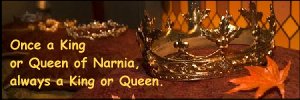1. Bilbo describes victory as "a very gloomy business." Why do you think Bilbo said that? How do you think Tolkien's personal experience might have prompted this statement?
2. The Arkenstone is buried with Thorin. What could the Arkenstone have symbolized, and what might its connection with Thorin's family and its burial symbolize?
3. The Elvenking gives a strange blessing to Bilbo. Tolkien writes that he is very grave when he says it, yet it is quite funny in its entirety. Why do you think Tolkien gave it this contrast? Does the graveness make the humor stronger, or take away from it?
4. Bilbo tells himself “you made a great mess of that business with the stone.” Do you agree with him? Why or why not?
Chapter 18 The Return Journey
Moderators: Pattertwigs Pal, coracle, Lady Arwen
6 posts • Page 1 of 1
-

Pattertwigs Pal 
- Cookie Queen of NarniaWeb
- Posts: 5262
- Joined: May 16, 2009
- Location: U.S.A.
- Gender: Female
Re: Chapter 18 The Return Journey
1. AAA! My cousin read that and blew his stack and stormed out of the room. I guess you'd have to live through that sort of stuff to know what he means.
How did that line go? After the battle of Moria when the naugrim annihiliated Azog and all his host, was it Thorin's father who said "Victory! Victory is Ours!" and his cousins all said to him:
But then, "The Hobbit" is supposed to be a bit on the lighthearted side, (as tolkien stories go). But what do I know, I avoided France back in the teens (1917-1919)
2. "Elves should avoid comment on dwarvish treasures..." I'll take a pass.
3. Strange? Grave? Funny? What a funny lot humans are, well I suppose. Life is much too short to be forever burdened by the horrors around us especially once they're done - else one could never appreciate any joy or peace. But then, elves ARE cursed to take the long term view.
4. Typical Hobbit Sense. What ELSE but a great mess would ensue - he started with a great mess! On the Other Hand, he did manage to tie things up in diplomatic manoeuvrings until the nasty blows could be put to "more appropriate use" Or as my cousin would put it, it's better to fight together than to fight eachother. But then I think he keeps his war nightmares up in a stout jar, locked in a heavy wooden box. "That way I can stand safely outside, looking in". All I said was that's what the TEPCO guys said before the earthquake. Then he HIT me. He actually HIT me. (I'm kidding!)
A rolling stone gathers no moss. You can gather a lot of karma after living a couple thousand years. Humans are lucky I guess. Something that Arwen said to Aragorn when he finally decided to cash in his chips: "fools I thought them - but if this is indeed the gift of The One to men, then it is hard to bear."
Death is after all, one of Tolkien's pet obsessions. The span of human life is short, and men pass in and out, leaving the memory of their bad karma up in some cosmic cookie jar somewhere supposedly this is part of some grand cooking experiment according to some theories
supposedly this is part of some grand cooking experiment according to some theories  I've never held with the gnostic idea that it was actually a kitchen disaster, but then we're all just bit players and my opinion is of small account. Law of Confusion not withstanding, for what it's worth, I have it on good authority that the story has a happy ending.
I've never held with the gnostic idea that it was actually a kitchen disaster, but then we're all just bit players and my opinion is of small account. Law of Confusion not withstanding, for what it's worth, I have it on good authority that the story has a happy ending.
How did that line go? After the battle of Moria when the naugrim annihiliated Azog and all his host, was it Thorin's father who said "Victory! Victory is Ours!" and his cousins all said to him:
"If THIS be victory, then our hands are too small to hold it"
But then, "The Hobbit" is supposed to be a bit on the lighthearted side, (as tolkien stories go). But what do I know, I avoided France back in the teens (1917-1919)
2. "Elves should avoid comment on dwarvish treasures..." I'll take a pass.
3. Strange? Grave? Funny? What a funny lot humans are, well I suppose. Life is much too short to be forever burdened by the horrors around us especially once they're done - else one could never appreciate any joy or peace. But then, elves ARE cursed to take the long term view.
4. Typical Hobbit Sense. What ELSE but a great mess would ensue - he started with a great mess! On the Other Hand, he did manage to tie things up in diplomatic manoeuvrings until the nasty blows could be put to "more appropriate use" Or as my cousin would put it, it's better to fight together than to fight eachother. But then I think he keeps his war nightmares up in a stout jar, locked in a heavy wooden box. "That way I can stand safely outside, looking in". All I said was that's what the TEPCO guys said before the earthquake. Then he HIT me. He actually HIT me. (I'm kidding!)
A rolling stone gathers no moss. You can gather a lot of karma after living a couple thousand years. Humans are lucky I guess. Something that Arwen said to Aragorn when he finally decided to cash in his chips: "fools I thought them - but if this is indeed the gift of The One to men, then it is hard to bear."
Death is after all, one of Tolkien's pet obsessions. The span of human life is short, and men pass in and out, leaving the memory of their bad karma up in some cosmic cookie jar somewhere
 supposedly this is part of some grand cooking experiment according to some theories
supposedly this is part of some grand cooking experiment according to some theories  I've never held with the gnostic idea that it was actually a kitchen disaster, but then we're all just bit players and my opinion is of small account. Law of Confusion not withstanding, for what it's worth, I have it on good authority that the story has a happy ending.
I've never held with the gnostic idea that it was actually a kitchen disaster, but then we're all just bit players and my opinion is of small account. Law of Confusion not withstanding, for what it's worth, I have it on good authority that the story has a happy ending.-

Elluinas Mirion 
- Posts: 23
- Joined: Dec 24, 2009
- Location: according to ML, on "Cloud 9"
Re: Chapter 18 The Return Journey
1. I think Bilbo comments on it because of all the loss and death that occurred; even though they'd won, there were many on the good side who were dead (as well as on the bad, but in this case the bad were irredeemable).
Tolkien had fought in battles before, so I'm Bilbo's thoughts are close to what his thoughts were on the matter.
2. If we're going along the idea that the Arkenstone was a symbol of the kingship, then burying it with Thorin was a final acknowledgement that he was indeed king, and possibly the last great true King under the Mountain.
At that point, I'm pretty sure no one was petty enough to make it a kind of "Here, you wanted it so badly, it's yours..." gesture.
3. I think the Elvenking was showing his regard for Bilbo with the funny blessing; I think the graveness makes the humour stronger. He's taking Bilbo seriously but not too seriously, which I think Bilbo would appreciate since he feels very small and just wants to go back to being a Baggins of Bag-End at that point.
4. Bilbo did make rather a mess of it; however, he couldn't have prevented the war with the Goblins regardless of what was happening with the Arkenstone. Indeed, the Dwarves, Elves, and Men may've been fighting amongst themselves when the Goblins arrived if Bilbo hadn't interfered.
Tolkien had fought in battles before, so I'm Bilbo's thoughts are close to what his thoughts were on the matter.
2. If we're going along the idea that the Arkenstone was a symbol of the kingship, then burying it with Thorin was a final acknowledgement that he was indeed king, and possibly the last great true King under the Mountain.
At that point, I'm pretty sure no one was petty enough to make it a kind of "Here, you wanted it so badly, it's yours..." gesture.
3. I think the Elvenking was showing his regard for Bilbo with the funny blessing; I think the graveness makes the humour stronger. He's taking Bilbo seriously but not too seriously, which I think Bilbo would appreciate since he feels very small and just wants to go back to being a Baggins of Bag-End at that point.
4. Bilbo did make rather a mess of it; however, he couldn't have prevented the war with the Goblins regardless of what was happening with the Arkenstone. Indeed, the Dwarves, Elves, and Men may've been fighting amongst themselves when the Goblins arrived if Bilbo hadn't interfered.
Some days you battle yourself and other monsters.
Some days you just make soup.
Some days you just make soup.
-

ValiantArcher 
- BC Head and G&B Mod
- Posts: 13195
- Joined: May 16, 2007
- Location: The Front Line
Re: Chapter 18 The Return Journey
1. Bilbo describes victory as "a very gloomy business." Why do you think Bilbo said that? How do you think Tolkien's personal experience might have prompted this statement?
He said that because of the silence of the area. He probably sensed all the death. I’m sure he felt that especially after he found out the fates of Thorin, Fili, and Kili, Bilbo was not use to war and was “a kindly little soul.” Unless an army comes out of a battle without any fighters losing their life, there is a gloom about it.
2. The Arkenstone is buried with Thorin. What could the Arkenstone have symbolized, and what might its connection with Thorin's family and its burial symbolize?
The Arkenstone symbolizes power. It had power over people, and the people who had it had some power. Since it was buried with him, it symbolizes the end of his line.
3. The Elvenking gives a strange blessing to Bilbo. Tolkien writes that he is very grave when he says it, yet it is quite funny in its entirety. Why do you think Tolkien gave it this contrast? Does the graveness make the humor stronger, or take away from it?
I think it is meant to be partly serious partly humorous. The seriousness of his tone makes the statement more interesting. We are left wondering if he was serious or not. I think the tone increases the humor. Sometimes funny words stated seriously are more funny than if they were stated jokingly.
4. Bilbo tells himself “you made a great mess of that business with the stone.” Do you agree with him? Why or why not?
He didn’t single-handily make a mess of things. Thorin was unpredictable so that affected the results of this plan. I think he should have given Thorin the stone right away. Gandalf seemed to think Bilbo did a good job. If nothing else, his actions lead to the dwarves coming to the mountains in time to help in the battle against the Goblins.
He said that because of the silence of the area. He probably sensed all the death. I’m sure he felt that especially after he found out the fates of Thorin, Fili, and Kili, Bilbo was not use to war and was “a kindly little soul.” Unless an army comes out of a battle without any fighters losing their life, there is a gloom about it.
2. The Arkenstone is buried with Thorin. What could the Arkenstone have symbolized, and what might its connection with Thorin's family and its burial symbolize?
The Arkenstone symbolizes power. It had power over people, and the people who had it had some power. Since it was buried with him, it symbolizes the end of his line.
3. The Elvenking gives a strange blessing to Bilbo. Tolkien writes that he is very grave when he says it, yet it is quite funny in its entirety. Why do you think Tolkien gave it this contrast? Does the graveness make the humor stronger, or take away from it?
I think it is meant to be partly serious partly humorous. The seriousness of his tone makes the statement more interesting. We are left wondering if he was serious or not. I think the tone increases the humor. Sometimes funny words stated seriously are more funny than if they were stated jokingly.
4. Bilbo tells himself “you made a great mess of that business with the stone.” Do you agree with him? Why or why not?
He didn’t single-handily make a mess of things. Thorin was unpredictable so that affected the results of this plan. I think he should have given Thorin the stone right away. Gandalf seemed to think Bilbo did a good job. If nothing else, his actions lead to the dwarves coming to the mountains in time to help in the battle against the Goblins.
-

Pattertwigs Pal 
- Cookie Queen of NarniaWeb
- Posts: 5262
- Joined: May 16, 2009
- Location: U.S.A.
- Gender: Female
Re: Chapter 18 The Return Journey
Pattertwigs Pal wrote:1. Bilbo describes victory as "a very gloomy business." Why do you think Bilbo said that? How do you think Tolkien's personal experience might have prompted this statement?
Because now they have to clean up the bodies. Although, I imagine a lost battle would be an even gloomier business.
As for Tolkien, he fought in the war, if I remember right. So I'm sure he experienced death in battle firsthand.
2. The Arkenstone is buried with Thorin. What could the Arkenstone have symbolized, and what might its connection with Thorin's family and its burial symbolize?
Perhaps it symbolizes the days when the Dwarves ruled over the mountain and all the treasure is theirs. Back when Thorin is still wanting to reclaim the mountain, he is simultaneously looking for The Arkenstone. When the Mountain is theirs at last, the Arkenstone is buried there beside him.
3. The Elvenking gives a strange blessing to Bilbo. Tolkien writes that he is very grave when he says it, yet it is quite funny in its entirety. Why do you think Tolkien gave it this contrast? Does the graveness make the humor stronger, or take away from it?
Sometimes people say jokes seriously on purpose, for added effect. But perhaps he also said it seriously to let Bilbo know that, although he's saying something funny, he is serious in wishing him well.
4. Bilbo tells himself “you made a great mess of that business with the stone.” Do you agree with him? Why or why not?
No, I don't think he made a mess of things. But it is in character for him to say such a thing, and be self-loathing in some respects.

~Riella

-

Ithilwen 
- Posts: 5885
- Joined: Jul 18, 2010
- Location: Taking over the world while twirling my evil girlstache.
- Gender: Female
Re: Chapter 18 The Return Journey
1. Bilbo describes victory as "a very gloomy business." Why do you think Bilbo said that? How do you think Tolkien's personal experience might have prompted this statement?
Victory came at a terrible cost. Several of his new Dwarven friends had fallen, and many of the people of the other races had fallen as well.
This would have been Tolkien's experiences, too, from WWI - some of his best friends had fallen, as well as countless young men of his own generation, not only grown, experienced warriors.
4. Bilbo tells himself “you made a great mess of that business with the stone.” Do you agree with him? Why or why not?
I agree with him to some extent. He had hoped to avoid any fighting whatsoever, and that was a complete failure - if the goblins hadn't come, the Dwarves would have fought the other races.
But at least his offer put Bard in a good position as far as gold was concerned, and he used it well, so some good came from it in the end ...
Victory came at a terrible cost. Several of his new Dwarven friends had fallen, and many of the people of the other races had fallen as well.
This would have been Tolkien's experiences, too, from WWI - some of his best friends had fallen, as well as countless young men of his own generation, not only grown, experienced warriors.
4. Bilbo tells himself “you made a great mess of that business with the stone.” Do you agree with him? Why or why not?
I agree with him to some extent. He had hoped to avoid any fighting whatsoever, and that was a complete failure - if the goblins hadn't come, the Dwarves would have fought the other races.
But at least his offer put Bard in a good position as far as gold was concerned, and he used it well, so some good came from it in the end ...
-

Varnafinde 
- Princess of the Noldor and Royal Overseer of the Talk About Narnia forum
- Posts: 2377
- Joined: Jul 13, 2005
- Location: Western Wild
- Gender: Female
6 posts • Page 1 of 1
Who is online
Users browsing this forum: No registered users and 1 guest

